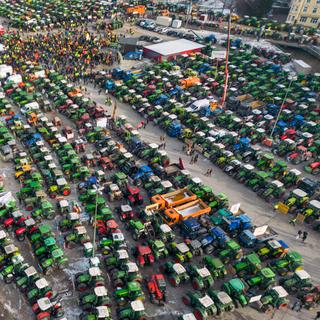


Farmers' anger is mounting across Europe
In DepthFrom the Netherlands to Romania, Poland, Germany and France, farmers have stepped up their actions against the European Green Deal and hikes in diesel taxes, all against a backdrop of inflation and competition from Ukrainian imports.
European farmers are fuming. From the Netherlands to Romania, Poland, Germany and even the south of the continent, they have been expressing their discontent, reinforcing European Union (EU) institutions' fears that this protest movement could spread, like the one that rocked France in 2018-2019 with the "Yellow Vests" crisis, and benefit the far right. These mobilizations, while each one has arisen for reasons of its own or linked to national decisions (higher diesel taxes, competition from Ukrainian imports, reduction in pesticide use, limitation of nitrogen or greenhouse gas emissions, more land to be left fallow to preserve biodiversity), come at a time of tense discussions in Brussels.
Supporters of productivist agriculture like France's main farmers' union FNSEA and its European counterpart the COPA-COGECA, have slammed the European Green Deal. This political initiative, backed by the European Commission, is designed to commit the EU member-states to environmental transition, and sets targets for reducing pesticide use, developing organic farming and protecting biodiversity.
"While the Green Deal's ambitions are justified in the context of the fight against climate change, they pose a problem for the agricultural sector. The issue has been instrumentalized and debates have become polarized," said French MEP Jérémy Decerle (Renew Europe).
Tensions have risen at a time when the European elections, set for June, loom. "In 2024, there are major deadlines with the European elections. It must be kept in mind that 30% of the European budget is earmarked for agriculture," stressed Arnaud Rousseau, the FNSEA's president, adding, "There are a number of heated arguments about European agriculture. The seeds of these protests are the same: There's a lack of understanding between the reality on the ground and the decisions taken by governments."
'The feeling of not being taken into account'
In Germany, the straw that broke the camel's back smelled of diesel. When Olaf Scholz's government decided in December 2023 to abolish so-called "climate-damaging" subsidies overnight – including public funding for agricultural diesel – in order to balance its budget, it had no idea it would trigger a large-scale movement among farmers. Several major demonstrations were conducted across the country. On Monday, January 15, several thousand tractors blocked the streets of Berlin for several hours – a rare event in Germany. Finance minister Christian Lindner, who had dared to make a statement at the demonstration, was booed at length.
You have 80% of this article left to read. The rest is for subscribers only.
